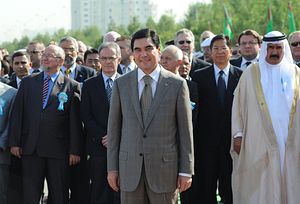Late last month, a bit of post-Soviet news fluttered under the radar, drowned out by Russian moves in Syria and U.S. officials hopping through Central Asian capitals. Last week, Ukrainian President Petro Poroshenko met with Turkmenistani President Gurbanguly Berdymukhamedov in Ashgabat. The two ex-Soviet nations have long enjoyed warm relations, largely on the back of Turkmenistan’s hydrocarbon trade. The head-of-state meeting last month illustrated that little has changed. The summit saw mutual assurances of gratitude and respect, with Poroshenko and Berdymukhamedov also pushing closer trade relations and the former pledging a return to Turkmenistan next year to tighten potential deals.
But commercial interests aside, the most notable result of the meeting may have little to do with gas. According to a report from Agence France-Presse, Turkmenistan expressed formal support for Ukraine’s sovereignty and territorial integrity. “We are grateful for the principled position of Turkmenistan’s support for the sovereignty, territorial integrity and independence of Ukraine,” Poroshenko said.
To date, Turkmenistan had remained mum in the 20 months following Russia’s incursion into southern Ukraine. While Kyrgyzstan and Kazakhstan recognized the Crimean “referendum” to join Russia – although Astana later backpedaled, and now claims support similar support for Ukrainian “territorial integrity” – Ashgabat had kept its silence on the matter, wary of unnecessarily provoking Moscow. But no longer. Nearly two years after the Euromaidan protests first began rocking Ukraine in late 2013, Turkmenistan has tossed its rhetoric behind Kyiv.
The move in late October may come as initially surprising, but when viewed in light of recent developments, it makes that much more sense. First, the Turkmenistani economy’s tailspin shows no signs of slowing – hence, the outreach for new clients. Second, Russia recently unveiled a Caspian militarism the sea that has never seen in the post-Soviet period, effectively quashing any momentum behind a trans-Caspian pipeline, to Turkmenistan’s detriment. And third, Russia-Turkmenistan relations are further chilled by a drop-off in gas trade, with Moscow’s import of Ashgabat’s gas continuing its precipitous decline. A few months after Turkmenistan publicly slammed Gazprom for failing to pay its debts – and six years after a pipeline explosion, potentially with Russian backing, rocked Russian-Turkmenistani ties – relations between the two remain frosty.
As such, these factors came to a head with Poroshenko’s visit. Instead of the bastion of neutrality Turkmenistan has long presented, Ashgabat suddenly thrust itself into Eurasia’s greatest territorial flashpoint. How – or if – Russia responds will be something to watch.

































